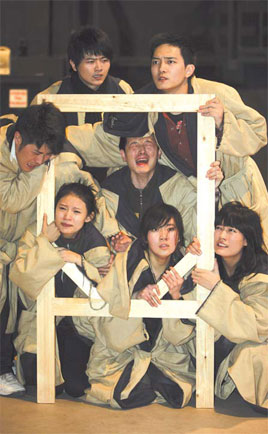To the generations that were born in the 1980s and 1990s the history of the zhiqing may appear strange, but for zhiqing (educated youth) themselves, it was unforgettable, especially those who worked in remote and backward places for 10 years. They suffered all kinds of torments, both physical and mental.
To commemorate that time, in November 1985, a group of zhiqing actors staged the play WM Wo Men (We) telling the story of seven zhiqing and their lives in the countryside, their returns to the city and their struggles in a changing society.
 |
|
A group of young actors who were born in the 1980s will stage WM Wo Men (We) in Beijing 23 years after it was first staged. [File photo] |
"The playwright Wang Peigong told me he heard many impressive stories about zhiqing, so he wanted to play it out. Then we discussed the drama and chose the actors," says Wang Gui, 77, who directed the play in 1985.
It was the first drama focusing on zhiqing life and its premiere was a sensation in Beijing.
"It was cold in November in Beijing. And the ticket price - 2 yuan - was not cheap for a person whose salary was 40 or 50 yuan (a month). But at 8 am, hundred of people had queued at the box-office. We had to limit tickets to two per person," recalls Wang.
But due to the sensitive theme of the play it was halted after 23 shows at the Cultural Palace of Nationalities.
"The actors were sad upon hearing the news. Some cried in silence and one knocked his head against the wall. The Shanghai People's Art Theater invited me to do the play again. But after 40 shows, it was stopped too," Wang says.
"A revival of the play has been my dream over the past 23 years," he adds, now the dream has come true.
Initiated by the Lin Zhaohua Theater Studio, a group of young actors will perform the play again and Wang has been invited to be the director.
"It was definitely an avant-garde play in 1985. I was labeled director of an avant-garde or experimental group, but I must admit that Wang was much bolder than me at that time," says the renowned director Lin Zhaohua, who also supervises the play.
"Today we commemorate the history of zhiqing as well as reminisce about the youth of a whole generation," Lin adds.
"Basically, I retain the presentation of the drama of some 23 years ago. But as time has passed by, I have new and more sophisticated interpretations of each character's personality," Wang says. "We tell the story of the old days to inspire today's people to think about their lives."
The problem is that the actors in 1985, including Li Xuejian, Liu Peiqi, Tong Ruixin, Xiao Xiong and Pu Cunxin, all of whom later turned out to be leading actors on China's drama circuit, were zhiqing themselves so they could easily play their parts. But to young actors who were born in the 1980s, it's a big challenge. They have little knowledge of the history, never experienced such hard lives and cannot understand the thoughts that went through their minds.
Wang, Lin and the actor surnamed Pu tried to share their knowledge and experience with the young performers.
"The more you feel close to yourself, the more you are close to the characters," Pu says.
"It was 40 years ago and a youth's life at any time has many common virtues such as passion, honesty and bravery, as well as confusion and uncertainty about future," the veteran actor says.
"Today's young people boast of individuality, independence and make decisions on their fates on their own, but they also feel anxious and have fears about the future, just the same as what the zhiqing felt some 40 years ago."
Their help has inspired the young actors.
"My parents were zhiqing, so when I got the role, I called my father in Shanghai immediately with great excitement," says Li Zonglei, 24, who plays the character The General.
"My father is the person I admire the most. I know my generation can hardly imagine the toughness and perseverance of what they went through when they were my age. I perform in the play as a gift to my father and to all zhiqing," Li says.
Li also mentions that his 55-year-old father, who worked in Anhui province for eight years, questioned whether he could perform the role well.
"He wrote me a long letter about the history and also introduced me to some of his zhiqing colleagues who told me their stories," Li says.
"From my point of view, zhiqing and today's youth have something in common. For example, both have ideas. Today we emphasize individuality and work hard to achieve our personal goals. They also pursued their goals, though they had the idea of working for society and for the people. The character I play always dreamed of being a general and he finally becomes a solider and was wounded in his eye in the war," says Li.
The play will premiere on Dec 23 and run until Jan 10.
(China Daily December 11, 2008)